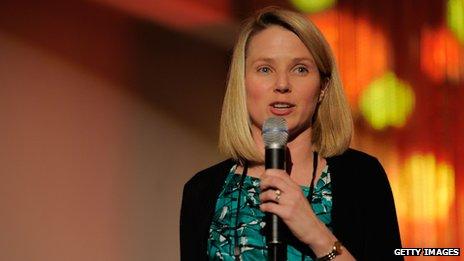Is pregnant Yahoo CEO a landmark?
- Published
- comments

The news that Marissa Mayer, the new chief executive of Yahoo, was appointed while six months pregnant has prompted a flurry of reaction. But how significant is the appointment for other women?
Within minutes of Marissa Mayer's move from Google to Yahoo - and her pregnancy - being announced, there was a wave of approval.
"CEO and pregnant announcements in one day? @marissamayer isn't just breaking the glass ceiling; she's annihilating it," <link> <caption>tweeted marketing consultant Lauren Hall-Stigerts</caption> <url href="https://twitter.com/lstigerts" platform="highweb"/> </link> .
"This is actually really, really important: Yahoo board knew Marissa Mayer is pregnant, hired her as CEO anyway," was the <link> <caption>verdict of Eric Nelson, the executive editor at John Wiley and Sons.</caption> <url href="https://twitter.com/ericatwiley" platform="highweb"/> </link>
Meanwhile Marie Claire's mum-to-be Emma Simkins penned <link> <caption>why a pregnant CEO is great news for women</caption> <url href="Http://www.marieclaire.co.uk/news/lifestyle/537242/why-a-pregnant-ceo-is-great-news-for-women.html" platform="highweb"/> </link> .
However it didn't take long for other commentators to seem slightly alarmed at how much prominence the pregnancy was getting.
"It is great that Marissa Mayer is pregnant. But intensity of reaction is slightly depressing. Kind of as if they'd hired a yeti," <link> <caption>tweeted Rebecca Traister</caption> <url href="https://twitter.com/rtraister" platform="highweb"/> </link> , a New York Times journalist and author of Big Girls Don't Cry.
So how significant is Mayer's posting, and what might it mean for other women?
It's difficult to say for sure, but none of those writing about Mayer seem able to recall a single other example of a major company recruiting a six months pregnant woman for the top job.
<link> <caption>TechCrunch says Mayer</caption> <url href="http://techcrunch.com/2012/07/16/marissa-mayer-the-first-ever-pregnant-ceo-of-a-fortune-500-tech-company/" platform="highweb"/> </link> may well be "the first ever pregnant CEO of a Fortune 500 tech company" and calls the announcement "trailblazing".
But the <link> <caption>Guardian's US newsblog points out</caption> <url href="http://www.guardian.co.uk/technology/us-news-blog/2012/jul/17/yahoo-marissa-mayer-pregnancy?newsfeed=true" platform="highweb"/> </link> Mayer is not the first female chief executive with a family, though it says "the number is depressingly low".
Even so, Dr Fiona Moore, a senior lecturer in human resource management at Royal Holloway, University of London, says Yahoo's move is to be celebrated.
"We're gradually getting towards the realisation that pregnancy and motherhood does not render women unable to do business," she says.
Of course there may be a number of factors that make Mayer's situation unique - her experience at Google and her plans to take just "a few weeks" of maternity leave. She says she wants to "work throughout".
It can be difficult to change jobs during a pregnancy. So could Mayer's high profile help more women make a similar move?
Employment lawyer Samantha Mangwana, a partner at Russell Jones & Walker, points out that in the UK it is completely unlawful to discriminate against a job applicant - both in terms of the job, or the decision to appoint someone - because of pregnancy or maternity leave.
But she says it is often hard to prove why people don't get a job. The difficulty of getting a job while pregnant is recognised by employment tribunals. It helps explain the size of rewards for pregnant women who win unfair dismissal cases.
Mangwana thinks Mayer has "a lot more bargaining power" than most women.
"It just takes a quick look at her CV to see why she was snapped up like gold dust. She was part of a team that turned Google from a start-up into a multi-billion dollar organisation," she says.
Few women are in Mayer's position.

"Qualifying for statutory maternity pay, or meeting the conditions for their company's enhanced maternity pay may be the main issue for many people. For senior executives like Mayer, the proposed level of earnings by ordinary or performance-related pay may outweigh those considerations. But for others, it makes a difference," she says.
Pregnant employees may feel deterred from making a move because a period of service is required before becoming eligible for maternity pay, she says.
"As a rough rule of thumb, you have to be at a company before you are pregnant to receive statutory maternity pay, but a longer period of service may be required to receive enhanced pay above this level. Often companies have benefit schemes which reward loyalty, so it may make sense to stay put."
Others agree Mayer is in an unusual situation.
"Some women can [have it all], absolutely. & I applaud her! but she makes my point. She's superhuman, rich, & in charge. Still need change!" <link> <caption>tweeted Anne-Marie Slaughter</caption> <url href="https://twitter.com/SlaughterAM" platform="highweb"/> </link> , the former director of policy planning at the US State Department.
While the <link> <caption>Wall Street Journal's Janet Paskin thinks Mayer has "ratcheted up the stakes"</caption> <url href="http://blogs.wsj.com/juggle/2012/07/17/yahoos-mayer-ratchets-up-the-stakes-for-working-moms/?mod=e2tw" platform="highweb"/> </link> for working mothers everywhere.
"I hope her delivery is free of complications and her baby is healthy. I hope if Mayer chooses to breastfeed, that all goes smoothly, that her son latches and her supply is plentiful. I hope he's not colicky. I hope he sleeps well," she says.
And <link> <caption>Slate's Jessica Grose worries</caption> <url href="http://www.slate.com/blogs/xx_factor/2012/07/17/marissa_mayer_is_pregnant_what_if_she_can_t_go_right_back_to_work_.html" platform="highweb"/> </link> that if Mayer does go quickly back to work, "employers will be even less accommodating to women who need (or want) more than a few weeks, and can't - or don't want to - work immediately after giving birth".
However, Moore argues Mayer has done more good for working women than harm.
"I've seen lots of anecdotal evidence that women are actively strategising their career in regards to family planning.
"Many women think 'If I get pregnant, I might not get the job. If I take a long maternity leave, they might not want me to come back. It's not true, but there is a lot of concern that women may be seen as less valuable to an organisation if they work flexibly or take a break," she says.
A high-profile case such as Mayer will "normalise" the idea that pregnant women can get jobs. "If women are thinking of going for a change of career, they might now think 'I can do this'," she says.